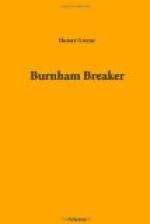The lawyer resumed his seat, spent a few moments looking over his papers, and then said, in a tone of mingled respect and firmness:—
“We desire, if your Honor please, to call Mrs. Burnham for the purpose of cross-examination.”
“That is your privilege under the law,” said the judge.
“Mrs. Burnham,” continued Sharpman, “will you kindly take the stand?”
“Certainly,” replied the lady.
She arose, advanced to the witness-stand, received the oath, and took her chair with a matronly dignity and kindly grace that aroused the sympathy and admiration of all who saw her. She gave her name, the date of her marriage to Robert Burnham, the fact of his death, and the names and ages of her children. In the course of the examination, she was asked to describe the railway journey which ended in the disaster at Cherry Brook, and to give the details of that disaster as she remembered them.
“Can you not spare me that recital, sir?” she said.
“No one would be more willing or glad to do so, madam,” responded Sharpman, “than I, but the whole future of this fatherless boy is hanging upon this examination, and I dare not do it. I will try to make it easier for you, however, by interrogation.”
She had hidden her face in her hands a moment before; now she raised it, pallid, but fixed with strong determination.
“Go on,” she said, “I will answer you.”
Sharpman stood for a moment as if collecting his thoughts, then he asked: “Did you and your husband, accompanied by your child Ralph and his nurse, leave your home in Scranton on the thirteenth day of May, 1859, to go by rail to the city of Philadelphia?”
“We did.”
“Was the car in which you were riding well filled?”
“It was not; no, sir.”
“How many children were in that car besides your son?”
“Only one.”
“A boy?”
“Yes, sir.”
“About how old?”
“About Ralph’s age, I should think.”
“With whom was he travelling?”
“With an elderly gentleman whom he called, ‘Grandpa.’”
“Before you reached Philadelphia, did the bridge over Cherry Creek give way and precipitate the car in which you were riding into the bed of the stream?”
“It did; yes, sir.”
“Immediately before that occurred where was your child?”
“He was sitting with his nurse in the second seat ahead of us.”
“And the other child, where was he?”
“Just across the aisle.”
“Did you see that other child after the accident?”
“I did not; I only know that he survived it.”
“How do you know it?”
“We learned, on inquiry, that the same old gentleman and little child went on to the city in the train which carried the rescued passengers.”
“You and your husband were both injured in the disaster, were you not?”




